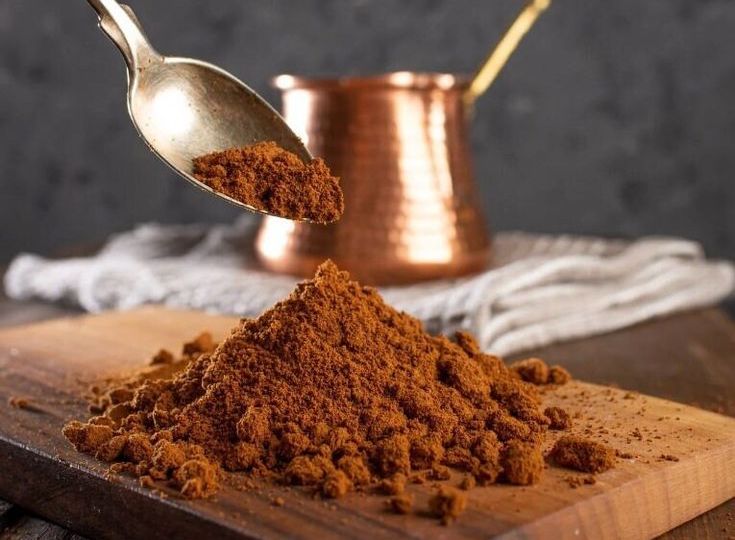
Turkish coffee isn’t just any coffee. It’s a unique brew that stands out because of its very fine grounds, unfiltered preparation, and strong, thick texture. Unlike your regular cup of joe, Turkish coffee involves simmering finely ground coffee beans with water (and often sugar) in a special pot called a cezve or ibrik. What makes it truly distinct is the way it’s served – grounds and all. That’s right, the coffee grounds remain in the cup, settling at the bottom, and contributing to the coffee’s rich, velvety texture.
Key Takeaways
- Unfiltered Goodness: The coffee is brewed without filters, letting the finely ground beans fully express their intense flavors.
- Strong and Thick: It’s served strong and thick, with the grounds adding to the body and flavor.
- A Sweet Companion: Traditionally, Turkish coffee comes with a glass of water and something sweet like Turkish delight or chocolate to balance its robust taste.
- Variety Is the Spice: Beyond the classic preparation, there are variations like Dibek, Menengiç, and Mirra, each bringing its own twist.
- Extra Fine for Extra Flavor: The coffee grounds for Turkish coffee are ground extra fine, finer than for espresso, making the flavor extraction efficient and the taste uniquely rich.
- More Than a Drink: It’s a cultural emblem, symbolizing hospitality and serving as a focal point for social engagement.
The Role of Turkish Coffee in Cultural Traditions
Turkish coffee is much more than a morning wake-up call; it’s a cornerstone of cultural tradition and social interaction. In Turkey and beyond, this rich, aromatic coffee plays a pivotal role in bringing people together, whether for casual catch-ups, intense political discussions, or significant life events.
A Social Staple
Imagine sitting in a cozy café or a living room filled with friends and family. In such gatherings, Turkish coffee is a must, serving not just as a beverage but as an excuse to pause, connect, and converse. It’s common for discussions over cups of Turkish coffee to range from everyday gossip to profound debates on politics and life’s dilemmas. This tradition underscores coffee’s role as a social lubricant, fostering an environment where sharing and camaraderie are cherished.
At the Heart of Ceremonies
Turkish coffee takes center stage in traditional Turkish weddings, embodying more than just hospitality. Before a marriage, it’s customary for the groom’s family to visit the bride’s family, where the bride-to-be prepares and serves Turkish coffee. Here’s where it gets interesting: sometimes, the bride adds salt to the groom’s coffee instead of sugar.
This act isn’t just playful sabotage but a test of his character and patience, qualities deemed essential for a harmonious marriage. Such traditions highlight how Turkish coffee is intertwined with cultural rituals, symbolizing respect, acceptance, and the start of a shared journey.
Fortune-Telling Fun
Beyond its social and ceremonial roles, Turkish coffee also carries a mystical charm. After enjoying a cup, it’s customary to flip the cup over onto its saucer, leaving patterns in the grounds that are believed to tell the drinker’s fortune. This practice, known as tasseography, is a beloved form of entertainment and reflection at many gatherings. It’s not just about predicting the future; it’s a way to stir imagination, bond over shared stories, and perhaps find meaning in the mundane.
Whether taken seriously or with a pinch of salt (or sugar!), fortune-telling with coffee grounds adds an enchanting layer to the Turkish coffee experience, weaving together tradition, mysticism, and the human desire for connection.
Variations and Global Influence
Turkish coffee’s name and preparation reflect a blend of history, culture, and even politics. Around the world, what we broadly refer to as “Turkish” coffee may adopt different names and tweaks in its recipe, each telling a story of its own.
For instance, in some countries that were once part of the Ottoman Empire, the coffee maintains its traditional name and preparation, celebrating a shared heritage. Elsewhere, nationalistic sentiments or historical rivalries have led to a renaming of the drink, distancing it from its Turkish association while preserving the essence of its preparation.
Variations like Dibek and Menengiç coffee introduce unique flavors and textures, enriching the global palette for Turkish coffee. Dibek coffee is ground in a stone mortar, offering a softer flavor, while Menengiç coffee, made from the roasted fruits of the terebinth tree, offers a caffeine-free alternative with a distinctive, slightly sweet taste. These variations not only cater to different preferences but also highlight the adaptability and widespread appeal of Turkish coffee across cultures.
The Art of Brewing Turkish Coffee
Brewing Turkish coffee is an art, demanding attention to detail, from the grind size of the beans to the serving presentation. The process starts with extra-fine coffee grounds, finer than what you’d use for espresso, to fully capture the essence and flavor of the beans.
A cezve or ibrik, a special pot, is central to the brewing process, where water, coffee grounds, and sugar (if desired) are combined and slowly brought to a simmer over low heat. This method allows for a rich extraction of flavors, resulting in the coffee’s signature thick, velvety texture and foam on top.
Reading Turkish Coffee Grounds: A Step-by-Step Guide
Drinking Turkish coffee is just the beginning; the real fun starts when you get to read the coffee grounds. After enjoying your coffee, take the cup you’ve just finished and cover it with the saucer. Swiftly but carefully flip it over. Wait a few moments, then lift the cup. The patterns left by the grounds are your map to the future.
Common symbols and their meanings vary, but here are a few to get you started:
- Hearts symbolize love or new relationships blooming.
- Keys often mean success or unlocking new opportunities.
- Mountains could indicate obstacles ahead.
- Snakes warn of jealousy or deceit.
- Purses hint at financial gain or new job prospects.
FAQs
Significance of Foam: The foam on Turkish coffee is a sign of good preparation. A lack of foam might mean the coffee isn’t fresh or was incorrectly brewed.
Turkish Coffee vs. Espresso Strength: Though rich and thick, Turkish coffee isn’t necessarily stronger than espresso. Both have their unique intensities and caffeine content, with Turkish coffee offering a unique experience due to its unfiltered nature.
Health Aspects: Turkish coffee, like any coffee, offers both benefits and drawbacks. Its rich antioxidants can be beneficial, but moderation is key due to caffeine content.
Final Thoughts
Turkish coffee offers more than just a caffeine kick. It’s a ritual, a centuries-old tradition steeped in culture, community, and conversation. From its unique preparation and serving methods to the art of reading coffee grounds, Turkish coffee encapsulates the essence of hospitality and warmth.









